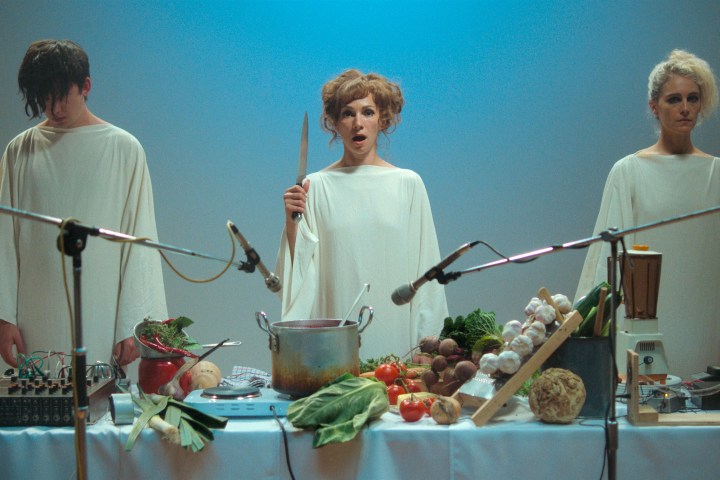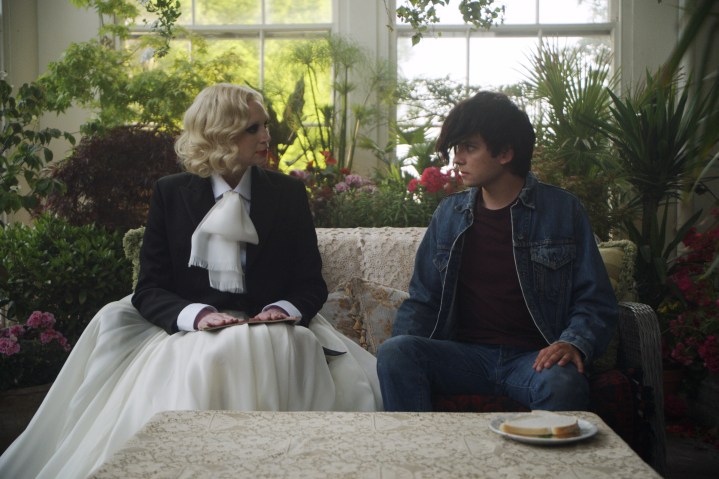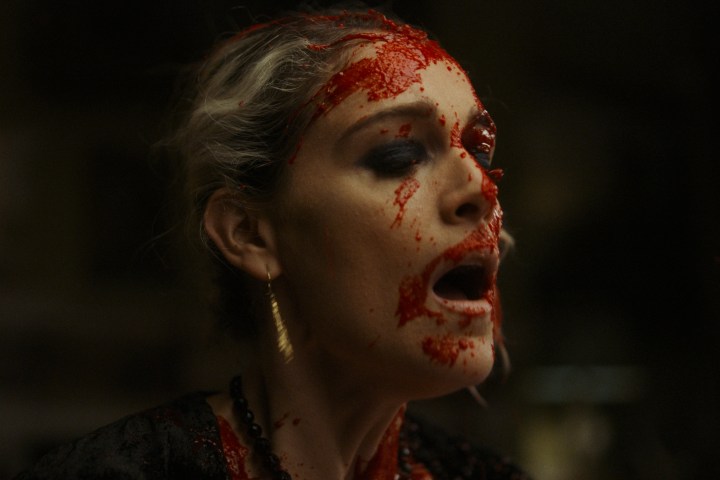Flux Gourmet exists in its own strange world, one where concepts like “good taste” and “bad taste” do not seem to exist.
Written and directed by cult British filmmaker Peter Strickland, the new film plays squarely by its own rules from start to finish, digging deeper and deeper into a world where performance art, food, sexual politics, and shame-inducing bouts of excessive flatulence (yes, you read that correctly) all intersect. Rarely, if ever, does Flux Gourmet stop to explain itself, and while another director might have chosen to make the film’s cast of characters the members of an underground movement, Strickland chooses to let them play in the sun above ground.
The film’s characters are never judged for their crudest actions, nor are their various kinks or provocative tendencies ever made to seem strange. Everything is presented in a straight-faced manner that calls to mind the work of several other contemporary film surrealists — namely, Yorgos Lanthimos. But by committing so fully to the matter-of-fact nature of his story, Strickland manages to imbue Flux Gourmet with a Lynchian sense of surrealism, one that makes watching the film feel less like you’re falling into a dream and more like you’re entering a world where dreams have seeped into reality.
Surrealistic performance art

Flux Gourmet is set in an institute devoted to promoting and nurturing artists who specialize in culinary and alimentary performances. When the film begins, the institute, which is run by Jan Stevens (a devilishly funny Gwendoline Christie), has just taken in a trio comprised of Elle di Elle (Fatma Mohamed), Billy Rubin (Asa Butterfield), and Lamina Propria (Ariane Labed). During their residency, they are monitored and interviewed by Stones (Makis Papadimitriou), a man who has recently begun to suffer from deeply painful build-ups of gas within his intestines.
Over the course of the film’s 111-minute runtime, the already fraught bonds between Elle, Billy, and Lamina are pushed to their breaking points, all while Stokes struggles to manage and hide his increasingly concerning stomach problems from the institute’s other occupants. At the same time, the institute and Jan continue to be the targets of attacks from a group that was denied the same residency given to Elle and her fellow performers.
If that plot description sounds like a lot, then now’s as good a time to note that the above summary only scratches at the surface of what lies in store in Flux Gourmet. The film is, among other things, less provocative and more thematically rich than it appears to be. At various points, Flux Gourmet even feels like a humorous battle of the wills between Elle, a stubborn and immovable artist who refuses to take others’ notes, and Jan, a manipulative tastemaker who seems far more stressed out than she likes to let on. At other points, the film feels like a comedy about the disarming ways in which the boundaries between an artist and their audience can not only blur but outright dissolve.
When Flux Gourmet is at its best, it feels like all of these things and more at once.
The power of suggestion

Strickland’s talent as a visual stylist is also strikingly apparent throughout Flux Gourmet. The director, working in collaboration with cinematographer Tim Sidell, fills the film’s frames with saturated colors and rich shadows, which add a visual sensuality to Flux Gourmet that only makes Elle’s culinary performances that much more impactful and disturbing. However, despite the numerous opportunities for gross-out visuals that his story provides, Strickland wisely brings a restrained hand to Elle, Lamina, and Billy’s various soup- and chocolate-covered performances.
Strickland understands that suggestion is often more powerful than actually showing anything, and he demonstrates that awareness several times throughout Flux Gourmet. In a truly inspired move, Strickland even pulls the rug out from under the film’s most stomach-churning sequence by revealing after the fact that not everything was as straightforwardly perverse as it appeared. That piece of information doesn’t so much take away from the power of the sequence in question, so much as it reveals the instinctual understanding Strickland has about the power of implication.
His visual prowess is heightened by several of Flux Gourmet’s performances, including Christie’s delightfully unhinged, Cheshire cat turn as Jan. Richard Bremmer also turns in one of the slimiest performances of the year as Dr. Glock, the condescending physician who takes on Stones as a patient. Ultimately though, it’s Fatma Mohamed’s searing, unwavering performance as Elle that leaves the biggest impression in Flux Gourmet. Strickland’s camera loves almost nothing more than spotlighting Mohamed’s face in Flux Gourmet, and it’s easy to see why when you watch the film.
Finding freedom through performance

Of course, as is the case in many of Strickland’s movies, there’s a lot going on in Flux Gourmet. The film never seems to be in short supply of ideas, but Strickland also struggles at points to bring them together into one cohesive whole. While the film’s meandering tone helps its more provocative moments stand out, a tighter runtime would have allowed Flux Gourmet the chance to feel more in tune with the focused nature of many of its characters, especially Mohamed’s Elle.
But the intense tonal control that Strickland has demonstrated throughout his career is also on full display in Flux Gourmet, a film that is frequently hilarious despite the perverse nature of many of its scenes. The film’s pitch-black humor is particularly present during its various rehearsal and performance sequences, which allows Strickland to further highlight how embarrassing and ridiculous the very act of public performance can be. The fact that Strickland manages to do that without losing sight of how freeing it also is to not only show yourself to others, but to be seen by them in return is a testament to how well Flux Gourmet works when it’s firing on all levels.
That doesn’t mean Flux Gourmet isn’t a film that will turn off most viewers. As a matter of fact, that’s exactly what it is. Consequently, whether or not you like Flux Gourmet will have less to do with its own artistic merits and more with where your own tastes lie. The same can be said for Elle and company’s boundary-pushing performances. Sometimes, all it takes to know whether you like something is to see or, as is more applicable in this instance, taste it.
Flux Gourmet arrives in theaters and on demand on Friday, June 24.
Editors' Recommendations
- Tár review: Cate Blanchett soars in Todd Field’s ambitious new drama
- Confess, Fletch review: Jon Hamm charms in crime comedy reboot
- Me Time review: Netflix’s latest comedy falls apart
- I Love My Dad review: Patton Oswalt in a catfish cringe comedy
- Bodies Bodies Bodies review: a viciously funny horror comedy




